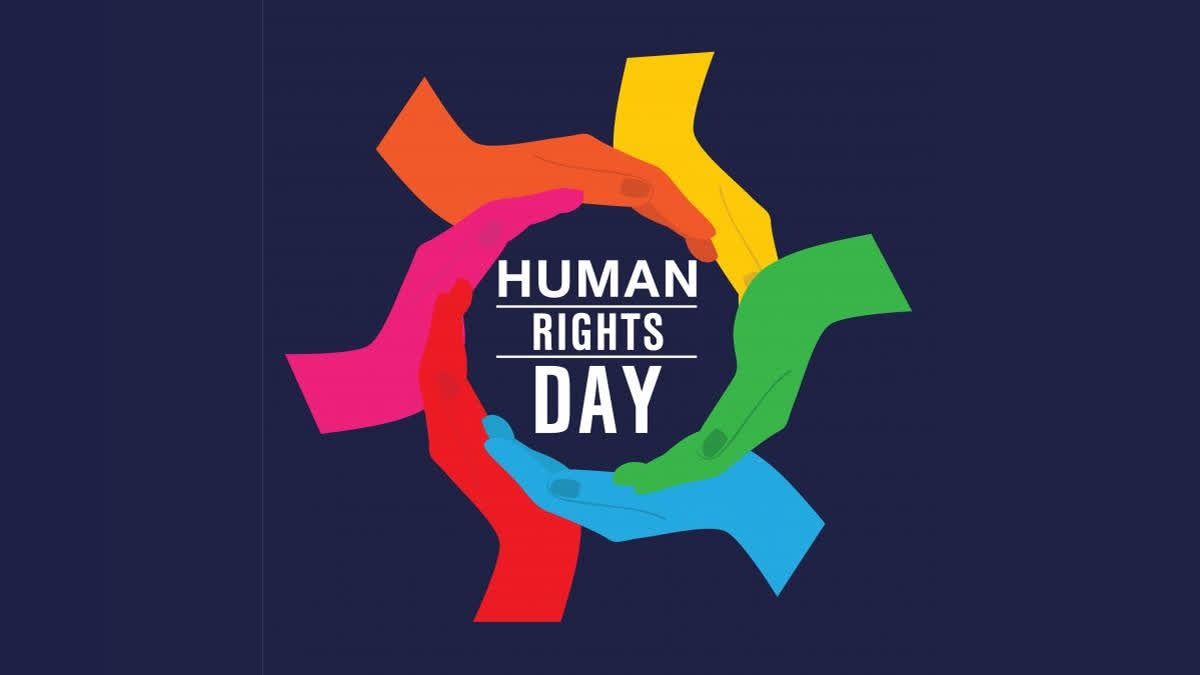New Delhi: Human Rights Day is observed on December 10 every year to commemorate the Universal Declaration of Human Rights (UDHR), which was adopted and proclaimed by the United Nations General Assembly in 1948. The UDHR serves as a global benchmark for the protection and promotion of human rights.
"Human Rights Day is an opportunity for various stakeholders worldwide to reflect on their actions and responsibilities, ensuring that they do not contribute to the violation of human rights," said the National Human Rights Commission (NHRC).
History & Significance
The Universal Declaration of Human Rights enshrines the inalienable rights that everyone is entitled to as a human being - regardless of race, colour, religion, sex, language, political or other opinion, national or social origin, property, birth or other status.
The declaration was proclaimed by the United Nations General Assembly in Paris on 10 December 1948 and sets out, for the first time, fundamental human rights to be universally protected.
The UDHR is a global blueprint for international, national, and local laws and policies and a bedrock of the 2030 Agenda for Sustainable Development.
Our Rights, Our Future, Right Now: Theme For 2024
This year’s theme is a call to acknowledge the importance and relevance of human rights in everyday life.
A UN resolution said, "Human rights can empower individuals and communities to forge a better tomorrow. By embracing and trusting the full power of human rights as the path to the world we want, we can become more peaceful, equal and sustainable."
This Human Rights Day focuses on how human rights are a pathway to solutions, playing a critical role as a preventative, protective and transformative force for good.
UN Secretary-General António Guterres has said, "Human rights are the foundation for peaceful, just, and inclusive societies."
Human Rights Day In India
To mark Human Rights Day, the National Human Rights Commission (NHRC) is organising a programme in New Delhi which will be graced by President Droupadi Murmu.
The event will be followed by a National Conference on 'Mental well-being: Navigating stress from classroom to workplace.' The three sessions include 'Stress among Children and Adolescents,' 'Mental health challenges in institutions of higher learning', and 'Stress and burnout at workplaces'. The conference aims to explore the psychological impacts of stress at various stages of life - From education to employment and propose recommendations to promote mental well-being across different sectors.
The event will be attended by NHRC, India Acting Chairperson, Vijaya Bharathi Sayani, Secretary General, Bharat Lal, along with senior officers, members of statutory commissions, SHRCs, diplomats, civil society, and other dignitaries.
NHRC Role in Protecting Human Rights
Established on October 12, 1993, the NHRC has consistently worked to ensure the protection of both civil and political rights, as well as economic, social, and cultural rights. It has made significant contributions to mainstreaming a human rights-centred approach in government policies and programs, and in raising awareness among public authorities and civil society through various initiatives.
The commission continues to foster human rights discussions at national and international forums and engages in dialogue with civil society, NGOs, human rights defenders, experts, statutory commission members, state human rights commissions, and government officials.
The NHRC, India has conducted numerous spot investigations, open hearings, and camp sittings since its inception. The Commission has established 12 core groups on various human rights themes and regularly holds discussions with experts and senior government officials to finalise recommendations.
Human Rights Violation Cases in India
During more than three decades of its inception, the NHRC registered a total of 23,14,794 and disposed of 23,07,587 cases, including 2,880 cases based on suo motu cognizance. It also recommended about Rs 256.57 lakh as monetary relief to the victims of human rights violations.
During the last year, from December 1, 2023, to November 30, 2024, the NHRC, India registered 65,973 cases and disposed of 66,378 cases, including those carried forward from previous years. It took suo motu cognisance in 109 cases and recommended Rs 17,24,40,000 in monetary relief to victims of human rights violations during this period of the last year.



